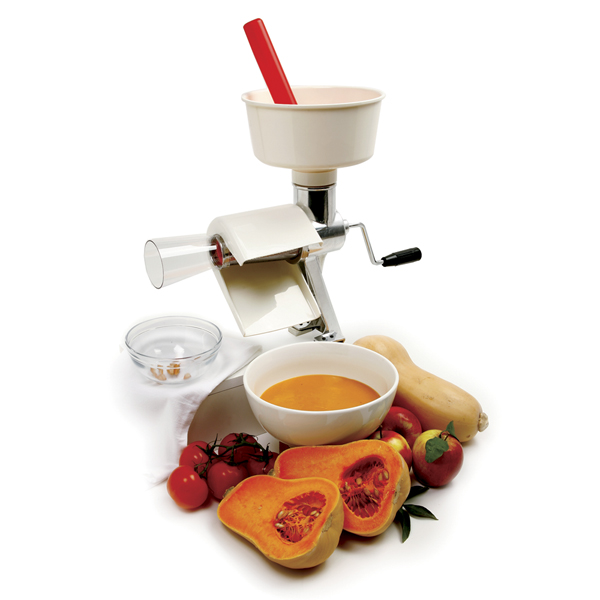Say Goodbye to the Metal Can:
Homemade Tomato Paste and Sauce
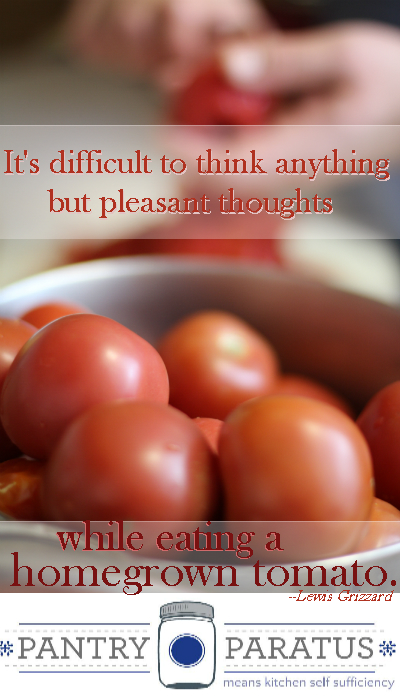
The Tomato Harvest
We don’t personally grow enough to meet our family’s demand. You have to do some pasta math, or casserole math, whichever applies. How often do you like marinara sauce–once a week? That’s 52 jars of sauce to get through the year! Gak. Before planting season even hits, consider how many tomato plants (based upon the varieties you prefer) will be required to get you close to this.
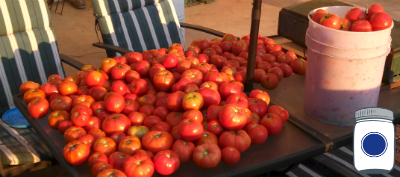
Then find your local food co-op, you-pick veggie garden, or avid gardening friend to supplement the rest! We have a local you-pick garden, but the saint who runs it guards her tomatoes with her life (and an electric fence). She will share everything she has with a complete stranger, as long as they don’t ask for tomatoes. I supplement with a food co-op.
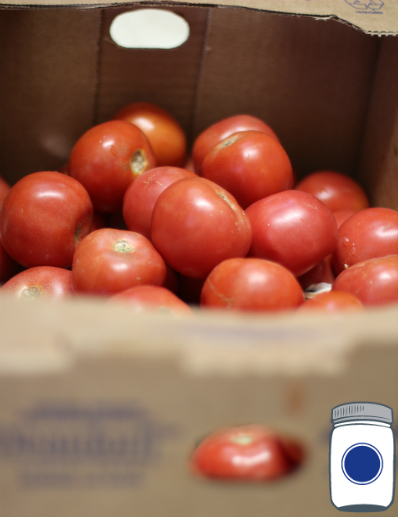
Making Sauce & Paste
There is no end with what you can do to a tomato. We enjoy slicing and dehydrating them; dehydrated tomato slices are wonderful dipped into a homemade dressing! Pantry Paratus makes salsa simple and consistently perfect with our Medium Tex-Mex Salsa Seasoning. Hands down, we use more tomatoes for homemade tomato sauce and tomato paste than for any other purpose. You will find that sauce and paste are worthy uses for your tomato harvest, providing meals quickly throughout the year that boast of flavor and freshness. A metal can is such a farce; you have not tasted sauce if you have only ever had the store-bought stuff. There are a few steps involved, but it is not difficult.
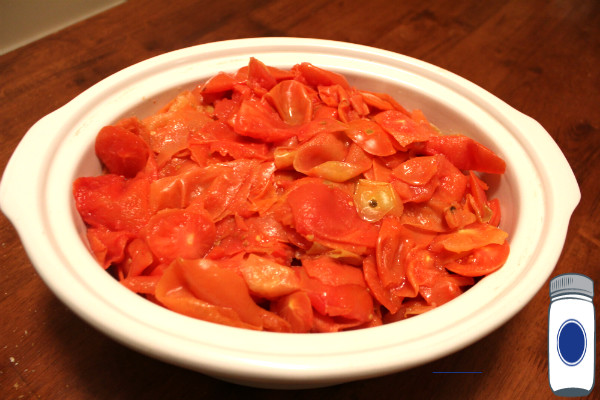
Now, I am on dangerous ground here. I am married to an Italian who learned how to make sauce straight from his little old Nonnie. She took days upon days to make her sauce, and it started with lots of simmering meat.
This is not that.
I also recently did a post on what to do with the tomato peels, and I received a few comments from people who say they never-ever-ever peel a tomato and they make wonderful sauce! Oh, I believe it, and they can invite me over for dinner any time. This is my disclaimer–I am not a chef, nor of a cultural heritage that would give me the Supreme Authority over how to make sauce. We do make tomato sauce a few times a year (twice thus far this year in only 3 months’ time). We have evolved our processes over time, and so please take any liberties you wish. In fact, if you have a system that works for you, be sure to share it in the comments! I will also say that I make sauce differently when working alone than I do when Wilson is by my side in the kitchen. That leads us to step #1….rope someone into helping you.
Washing Tomatoes
Diligence to cleanliness is very important no matter the source for your produce. However, it is far more important in this modern era than ever before to thoroughly wash all produce! Now, when things are sprayed and coated, shellacked and plasticized prior to purchase–we cannot take a shortcut here!
Wash all fruits and vegetables with vinegar or some other well-researched fruit wash, then rinse in clean water.
If Peeling…
This may be a matter of personal preference. It does add a few steps. I think that it is worth it for a smooth tomato paste, but I also cheat occasionally on this one; a peel here or there is not noticeable in the least.
1) Blanch tomatoes in boiling water. I create a system using my stainless steel collander in a pot with the same circumference so that I can minimize my time over the steamy pot. Tomato skins will begin to split open when they are done. This only takes a few minutes. Putting someone on the “blanching station” speeds this process up considerably.
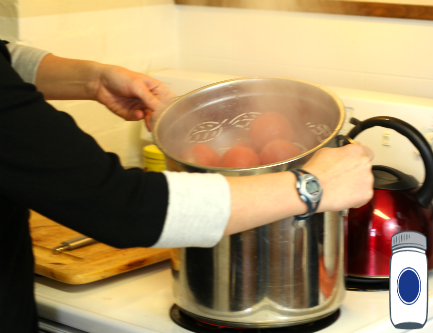
2) Quick rinse with cold water. This immediately stops the cooking process from the blanching and makes peeling them downright fun, because the skins just pop off. If using a Sauce Master II, this is where you “choose your own ending” and skip down to “Mash Tomatoes.” This is a major time saver, if you should choose to accept it.
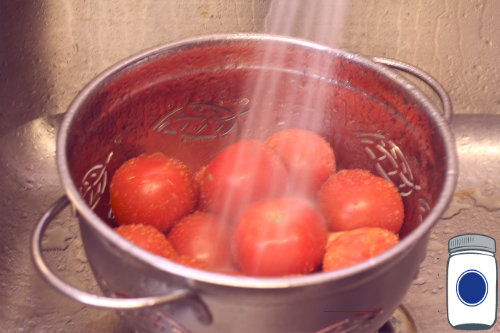
3) Pop off the skins & core. Wilson prefers to do this with a little grapefruit knife he picked up once at a thrift store, because it gets the core without sacrificing any of that amazing tomato flesh.
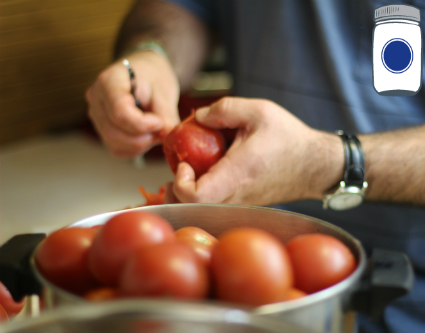
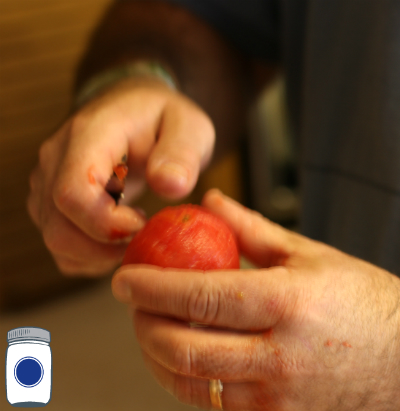
(Whether peeling or not)…
Mash Tomatoes. Using a Saucemaster with the salsa screen will save you much time in the long run, because you really won’t need to bother peeling them and the tomatoes will break down faster and more evenly during the simmering process.
As an alternate method, just use a masher like this one:
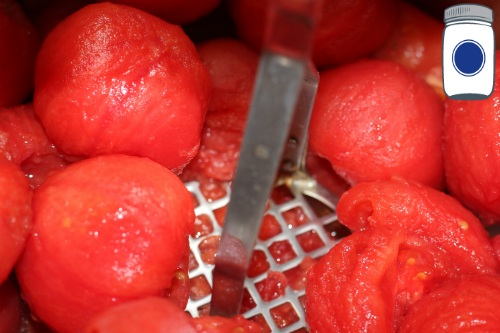
Place Tomatoes in Stock Pot and Simmer. They will create their own juice immediately and so there should be no need to add water. If mashing by hand, this is when you will do it. Just keep the heat between medium and low at this point. Lower heat for longer time will yield a richer sauce. Oh, if you could only taste Nonnie’s sauce, which simmered for many days!
Season to Taste. I am not going to give specifics. I might run the risk of blabbing the family’s secret recipe. What will be your main purpose for the sauce? We prefer things like Garlic (it deserves capitalization), sea salt, pepper, fresh rosemary, basil and thyme. Oh, and oregano from the garden will give your family an added immune-boost throughout the winter months when eating your homemade sauce!
Tomato Sauce or Tomato Paste
I generally make some of both simultaneously to save time and dishes; this means that the only difference between them was the length of time on the stove. Tomato paste must cook much, much longer. Ours has been on the stovetop for over 48 hours on simmer, with very frequent stirring (especially towards the end). I use my All American pressure canner on tomato sauce, and although I sometimes pressure can tomato paste I usually prefer to use my Excalibur Dehydrator. So, if paste takes longer is it worth the time? I kissed that metal can goodbye a long time ago (though not literally because I don’t like the taste of BPA on my lips). So yes, it is!
To Pressure-Can Sauce:
Tomatoes and tomato products should be pressure canned unless you are using a specific recipe with added acid to ensure safety. Since our sauce is “a little of this and that” in regards to spices and I do not add additional acid, I always pressure can it! Many tomatoes have had the acid bred right out of them, so the proper food-handling procedures have changed over time. Refer to your All American Pressure Canner Manual for the proper gauge weight and time required; this varies based upon altitude. My friend Sharon from SimplyCanning.com has a lot on the subject, too.
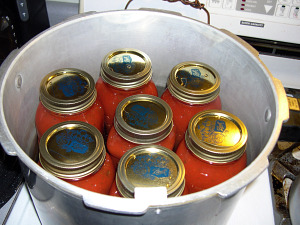
This picture shows Sharon from SimplyCanning.com hard at work!
To Dehydrate Paste
I prefer this for a few reasons: 1) it is fit for long-term food storage, 2) it reconstitutes in a matter of seconds in a small stock pot of boiling water, 3) it has less water weight and takes less room in my pantry, and 4) it is absolutely magical in its versality.
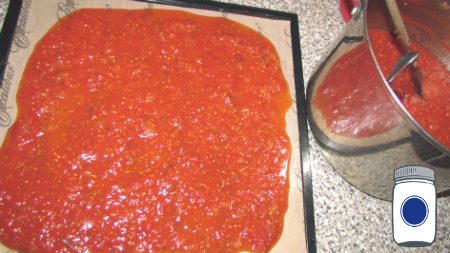
Once the sauce has thickened, you spread it out onto your Excalibur Paraflexx sheet just like a fruit leather. You will dehydrate this way past fruit leather stage, though. Dehydrate them until they are crispy sheets. Vacuum seal them for long term food storage. I usually put some into a mason jar with an 50cc oxygen absorber for my immediate kitchen use. Then, when I need to add some tomato paste to chili, soup, or stew, I have it at my fingertips. No metal can required!
Feeling Saucy,
Chaya
Pantry Paratus is committed to kitchen self-sufficiency. You will find many great tools & supplies for making homemade sauce–and anything else for that matter–so be sure to browse our store!
All pictures (with exception to the jars in canner by Simply Canning) belong to Pantry Paratus. Feel free to share or pin this in connection to this blog with proper attribution. Thank you.
Proviso:
Nothing in this blog constitutes medical or legal advice. You should consult your own physician before making any dietary changes. Statements in this blog may or may not be congruent with current USDA or FDA guidance.

